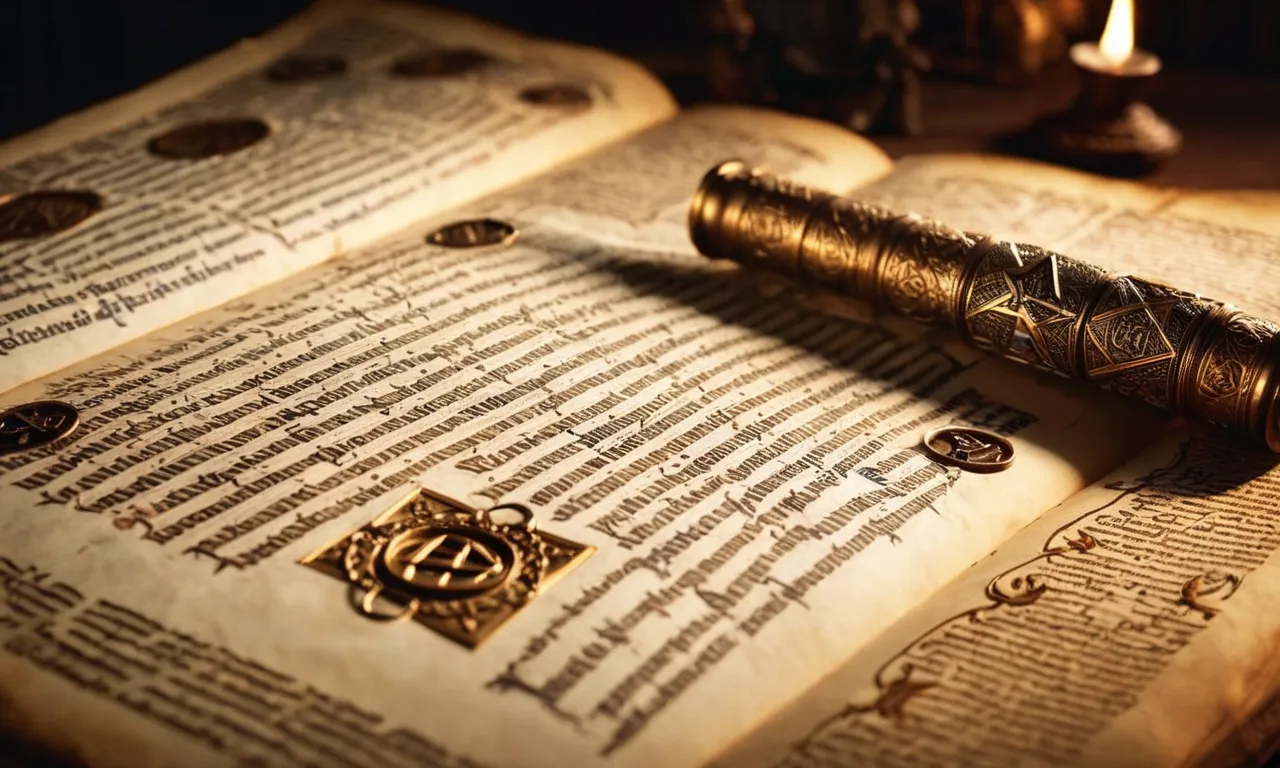What Is A Sorcerer In The Bible? A Detailed Look
The mention of sorcerers and sorcery in the Bible often brings intrigue and fascination. But who exactly were these mystical figures, and why did they garner such attention in the biblical texts? In this comprehensive guide, we’ll take a close look at sorcerers in the Bible to understand their origins, practices, and significance.
If you’re short on time, here’s the quick answer: In the Bible, a sorcerer was someone who practiced magic, divination, or occult arts by invoking supernatural powers or spirits. They were condemned and forbidden under Mosaic Law.
Sorcerers appear in accounts from Egypt, Babylon, and the early church.
Defining Sorcery in the Ancient Biblical World
Occult Practices and Deceptive Magic
In ancient times, sorcery referred to occult practices and rituals that were believed to harness supernatural forces to manipulate reality. These could involve divination, necromancy, charms, potions, and illusions that seemed magical.
The term comes from the Greek word pharmakeia, referring to drug-aided witchcraft or magic (Source). The deceptive nature of these practices is emphasized in biblical texts.
For example, Exodus 22:18 states, “Do not allow a sorceress to live.” This underscores how seriously forbidden and deceptive these activities were seen at the time. Yet some continued to secretly engage with magics and spirits despite prohibitions.
The mystical nature made claims seem extraordinary but fraudulent to biblical writers. Today occult practices persist, but science sees magic as stagecraft exploiting psychological biases.
Pagan Roots of Sorcery
The supernatural practices associated with ancient sorcery almost always originated from pagan religions outside Judaism and Christianity. Secret rituals would invoke foreign deities or tap hidden spiritual forces, seen as false gods or even demons by biblical figures.
The Old Testament makes over 180 references to magics derived from Mesopotamian, Egyptian, Canaanite, and other pagan sources (Source).
For example, King Manasseh in the Book of Kings is condemned for bringing pagan forms of fortune-telling and divination into Israelite society. The prophets and biblical kings strongly opposed any syncretic adoption of rituals from non-Yahwistic faiths.
Sadly, the wayward allure of magic often turned God’s chosen people towards pagan gods over reliance on divine providence.
Forbidden by Mosaic Law
The Mosaic Law explicitly forbids all forms of sorcery, seen as abhorrent to God. Deuteronomy 18:10 states that no one shall be found among God’s people who “practices divination or sorcery, interprets omens, engages in witchcraft, or casts spells, or who is a medium or spiritist or who consults the dead.”
The covenant code sternly warns the Israelites not to emulate pagan customs or magic arts.
Leviticus 20:6 also decrees harsh punishment for turning to mediums or necromancers, as King Saul once did before a battle (1 Samuel 28). As the central authority governing ethics and worship for the Israelites, Mosaic Law leaves no doubt about the illegitimacy and sinfulness of magical practices.
All magic is portrayed as deceitful trickery aimed at manipulating vulnerable people.
Examples of Sorcerers in Biblical Accounts
Sorcerers in Egypt
The book of Exodus describes how Pharaoh’s sorcerers and magicians were able to replicate some of the miracles performed by Moses and Aaron, such as turning staffs into snakes. However, they were eventually overpowered by God’s mightier powers.
This demonstrated how sorcery ultimately falls short compared to the true power of God (Exodus 7-9).
Sorcery in Babylon
The book of Daniel tells how King Nebuchadnezzar called on his sorcerers and astrologers to interpret his dreams, but they were unable to do so. Only Daniel, empowered by God, could interpret the meaning of the king’s dreams (Daniel 2).
This showed that true wisdom comes from God, not pagan occult practices.
Simon the Sorcerer in Samaria
Simon was a man who had practiced sorcery in Samaria for a long time, amazing people with his magical powers. But when he encountered Philip who preached the good news of God’s kingdom and performed miraculous signs, Simon believed and was baptized.
However, later Simon tried to buy the gift of the Holy Spirit from the apostles, which led to Peter’s rebuke (Acts 8:9-24).
Elymas the Sorcerer in Cyprus
When Paul and Barnabas visited Cyprus to spread the gospel, a Jewish sorcerer named Elymas tried to oppose them. But empowered by the Holy Spirit, Paul rebuked Elymas for his sin and temporarily blinded him.
This demonstrated the superiority of God’s power compared to dark spiritual forces (Acts 13:6-12).
Biblical Condemnation of Sorcery
Associated with Demonic Forces
The Bible makes it clear that sorcery is associated with demonic forces and strongly condemned. Sorcerers were thought to gain their power through contracts or alliances with evil spirits. Passages like Deuteronomy 18:10-12 warn God’s people not to practice sorcery or consult with mediums, as this would defile them.
The sorcerers of Egypt who opposed Moses in Exodus 7:11 were able to perform supernatural acts, but their power source was not from God. The book of Acts describes believers who formerly practiced sorcery but abandoned it after coming to faith in Jesus (Acts 19:19).
The biblical viewpoint is that sorcery and the occult involve trafficking with demonic powers that God’s people should avoid.
Defiling to God’s People
The Bible clearly states that sorcery defiles and pollutes God’s people. Passages like Leviticus 19:31, 20:6 and Deuteronomy 18:9-14 explicitly forbid God’s people from practicing divination, sorcery, casting spells, consulting mediums or spiritists.
Such practices would make the Israelites unclean and unacceptable to God. Sorcery was one of the sins for which God judged the Canaanites and drove them from the Promised Land (Deuteronomy 18:9-14). King Manasseh of Judah was rebuked for practicing sorcery and leading the people astray through occult practices (2 Kings 21:6, 2 Chronicles 33:6).
The New Testament also condemns sorcery as a work of the flesh (Galatians 5:20) that will prevent one from inheriting God’s kingdom (Revelation 21:8). The consistent biblical view is that sorcery corrupts and defiles God’s holy people.
Punishable by Death
Under the Mosaic Law, the practice of sorcery was a capital crime punishable by death. Exodus 22:18 states unambiguously, “Do not allow a sorceress to live.” Leviticus 20:27 prescribes that “a man or woman who is a medium or spiritist among you must be put to death.”
Practicing magic, divination, consulting the dead or giving oneself over to occult practices incurred the death penalty under God’s law given to Israel. Even seeking counsel from sorcerers was punishable by death (Leviticus 20:6).
This shows how seriously God regarded the occult and how strongly He wanted it expunged from Israel’s midst. While sorcery itself was not always punished directly with execution, it was seen as an abominable sin that corrupted God’s people and invited His judgment.
Some examples from Scripture illustrate this:
- When Balaam was hired by Balak to curse Israel, God sent an angel with a sword to kill him for his willingness to practice divination and sorcery against God’s people (Numbers 22:22-23)
- King Saul died for consulting a medium, which was banned in Israel (1 Chronicles 10:13-14)
- Ahaziah died because he sought counsel from the pagan god Baal-Zebub (2 Kings 1:2-4, 16-17)
- In Ephesus, those who formerly practiced sorcery publicly burned their magic scrolls after coming to faith in Jesus (Acts 19:19)
Significance and Legacy
Symbol of Foreign Influence
Sorcerers were often viewed as symbols of dangerous foreign religious influence in ancient Israel. Their practices were seen as idolatrous and a deviation from true worship of God. Many biblical texts associate sorcerers with Egypt, Babylon, and Canaan, depicting them as outsiders threatening Israelite society and faith.
For example, the book of Exodus portrays the Egyptian magicians who opposed Moses as sorcerers manipulating powers beyond their understanding (Exodus 7:11). Their occult abilities directly challenged God’s miracles through Moses.
This established sorcery as an inferior imitation of God’s limitless power.
Contrast to Prophetic Ministry
Sorcerers claimed mystical knowledge and powers, often for a fee. But true prophets spoke on God’s behalf, condemned magical practices, and did not use the supernatural for personal gain. This contrast revealed the self-serving nature of sorcerers.
The prophet Isaiah condemned Babylon’s sorcerers for being unable to save the empire from destruction (Isaiah 47:12). Jeremiah said false prophets and diviners would face God’s judgment for deceiving the people (Jeremiah 27:9).
Sorcerers were imperfect vessels of spiritual insight compared to authentic prophets.
Warning Against Spiritual Deception
The Bible presents sorcery as a form of spiritual deception. Sorcerers believed they could manipulate unseen forces and gain hidden knowledge. But their practices relied on demonic powers or deception, not divine truth.
Accordingly, scripture contains solemn warnings against magic and witchcraft. God forbids these practices numerous times in the law He gave to Israel (Exodus 22:18, Deuteronomy 18:10). Even seeking guidance from mediums and spiritists is branded as detestable.
New Testament texts like Revelation 21:8 and Galatians 5:20 include sorcery in lists of serious sins. The spiritual danger it posed was considered on par with sexual immorality, idolatry, and hatred.
Conclusion
In summary, sorcerers were mystical practitioners of prohibited occult arts in the biblical narrative. Though fascinating in popular culture, sorcerers were consistently presented as dangerous and deceptive in scripture.
Their presence served as a spiritual threat and a contrast to true prophetic ministry. While sorcery practices may persist today, the Bible remains clear on God’s condemnation of these dark arts.








